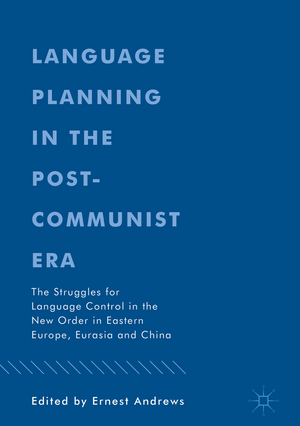Language Planning in the Post-Communist Era: The Struggles for Language Control in the New Order in Eastern Europe, Eurasia and China
Editat de Ernest Andrewsen Limba Engleză Hardback – 12 feb 2018
| Toate formatele și edițiile | Preț | Express |
|---|---|---|
| Paperback (1) | 725.92 lei 6-8 săpt. | |
| Springer International Publishing – 4 iun 2019 | 725.92 lei 6-8 săpt. | |
| Hardback (1) | 731.10 lei 6-8 săpt. | |
| Springer International Publishing – 12 feb 2018 | 731.10 lei 6-8 săpt. |
Preț: 731.10 lei
Preț vechi: 891.59 lei
-18% Nou
Puncte Express: 1097
Preț estimativ în valută:
139.90€ • 145.78$ • 115.83£
139.90€ • 145.78$ • 115.83£
Carte tipărită la comandă
Livrare economică 03-17 aprilie
Preluare comenzi: 021 569.72.76
Specificații
ISBN-13: 9783319709253
ISBN-10: 3319709259
Pagini: 372
Ilustrații: XIII, 316 p.
Dimensiuni: 148 x 210 mm
Greutate: 0.54 kg
Ediția:1st ed. 2018
Editura: Springer International Publishing
Colecția Palgrave Macmillan
Locul publicării:Cham, Switzerland
ISBN-10: 3319709259
Pagini: 372
Ilustrații: XIII, 316 p.
Dimensiuni: 148 x 210 mm
Greutate: 0.54 kg
Ediția:1st ed. 2018
Editura: Springer International Publishing
Colecția Palgrave Macmillan
Locul publicării:Cham, Switzerland
Cuprins
Introduction; Ernest Andrews.- Chapter 1: Language Planning: Theoretical Background; Ernest Andrews.- Chapter 2: Language Planning in China: Unity, Diversity, and Social Control; Fengyuan Ji.- Chapter 3: Language Policy in Russia: Language, Identity and Nationality; Joan Chevalier.- Chapter 4: Language Policy and Power Politics in Post-Soviet Tatarstan; Teresa Wigglesworth-Baker.- Chapter 5: Language Policy and Hegemony in the Central Asian Republics Ayse Dietrich.- Chapter 6: Language Policy in Independent Ukraine: A Battle for National and Linguistic Empowerment; Vladislava Reznik.- Chapter 7: Lithuanian Language Planning: A Battle for Language and for Power; Loreta Vaicekauskienė and Nerijus Sepetis.- Chapter 8: Language Planning in Latvia as a Struggle for National Sovereignty; Andrejs Veisbergs.- Chapter 9: The Polish Language Act: Legislating Language in a Complicated Linguistic-Political Landscape; Magda Stroinska and Ernest Andrews.- Chapter 10: Language Planningin Slovakia: Nation-Building in the Context of European Integration; Marián Sloboda, Lucia Molnár Satinská and Mira Nábělková.- Chapter 11: Forms of Language Planning and Policy in the Czech Republic; Hana Srpova.
Recenzii
“The book presents a series of country studies that give a historical account of ‘the evolution of the country’s ‘national’ language’, and, of language planning activities since the ‘start of the Perestroika reforms in the Soviet Bloc in the late 1980s’ … . this volume offer plenty of reference points, while the post-communist country descriptions emphasizing legislative events and institutions equally offer fine entry points for readers to pursue in-depth study of their own.” (Björn Jernudd, Language Policy, Vol. 18, 2019)
Notă biografică
Ernest Andrews is Visiting Scholar at the Department of Linguistics, Indiana University Bloomington, USA. His previous publications include Linguistic Changes in Post-Communist Eastern Europe and Eurasia (2008), and Legacies of Totalitarian Language in the Discourse Culture of the Post-Totalitarian Era: The Case of Eastern Europe, Russia and China (2011).
Textul de pe ultima copertă
This volume provides an in-depth analysis of the attempts of language experts and governments to control language use and development in Eastern Europe, Eurasia and China through planned activities generally known as language planning or language policy. The ten case studies presented here examine language planning in China, Russia, Tatarstan, Central Asia, Ukraine, Lithuania, Latvia, Poland, Slovakia and the Czech Republic, and focus in particular on developments and disputes that have occurred since the ‘fall of communism’ and the emergence of a new order in the late 1980s. Its authors highlight the dominant issues with which language planning is invariably intertwined. These include power politics, tensions between ‘official language’ and ‘minority languages’, and the effects of a country’s particular political, social, cultural and psychological environment. Offering a detailed account of the socio-political and ideological developments that underlie language planning in theseregions, this book will provide a valuable resource for students and scholars of linguistics, cultural studies, political science, sociology and history.
Caracteristici
Provides a clear view of the essential features of ‘language planning’ before presenting examples from countries of the former communist bloc Observes patterns of change and continuity in language planning at different historical periods in the countries in focus Deals with a range of issues intertwined with language planning, including changes in the social, political and cultural environment Draws a clear distinction between covert and overt attempts at controlling language development and use
